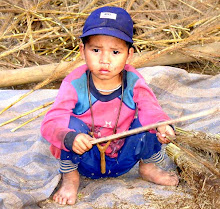Over the next few days I will share with you some of my thoughts regarding how we prepare young people to serve God. I believe that the most effective leaders are not the ones who are taught, but the ones who are discipled. Jesus knew what he was doing when he took twelve disciples to follow and serve with him for three years rather than opening a school offering classes on theology.
The tall African man stood up in front of the class and asked the room full of mid-western Bible college students, “When you come to my country with your Bible degree—what do you have to offer the people here? Will our government let you in? Will a company hire you to fill a position? Will you know how to install water systems? Will you know how to grow crops to feed the hungry or vaccinate their livestock? Will you know how to train the people in health education? Will you be able to teach them about business? Will you be able to process and market their products to international companies?”
The point was well-taken. Many times we are prepared only for spiritual needs and strategies for planting churches. We have learned the Bible well, but we have nothing to offer people in the areas they are most concerned about. True, people’s greatest need is to be forgiven and reconciled to God—but addressing felt needs is often the best way that we show love and compassion and open the door to spiritual transformation. Jesus did this very thing. He healed the sick. He fed the hungry. And he also preached repentance to those same people.
Jesus also equipped his disciples to meet the felt needs of people. Jesus trained his disciples and gave them special abilities to use among the people. In Matthew 10 Jesus sends out his twelve disciples on a short-term mission and instructs them to preach the message of God’s kingdom, and to “heal the sick, raise the dead, cleanse those who have leprosy, [and] drive out demons.” (Matthew 10:8)
But before he sent them out, Matthew 10:1 says that Jesus, “gave them authority to drive out evil spirits and to heal every disease and sickness.” Before he sent them out, he prepared them to deal with the real issues people were facing. In helping people with their physical problems they would have an audience for their spiritual message.
An important part of our discipleship program here at our location is training our young interns in agriculture. Because a large percentage of the population of this country works in agriculture, this is a very important subject. In particular, we teach our interns to be able to do certain things that most nationals don’t already know how to do, such as raise tilapia or frogs, make organic fertilizer, grow soybeans, cultivate and plant fruit trees. Even if our interns do not continue on to work with us, they have valuable skills to use and introduce to their own villages. These will help them not only to feed their own families, but to help others to feed their families, too. It will also give them an opportunity to build relationships with people and share the message of Christ.
Six post summary:
1. Jesus’ life was already an ongoing example of effective ministry, of which he later included them, before he called them and before he sent them out to do ministry on their own.
2. After spending time in prayer Jesus chose specific people to be his disciples, to live with him and follow him for about three years. He chose a limited number of people and poured himself into them rather than trying to get as many as he could.
3. Jesus didn’t simply make scheduled teaching appearances with his disciples but invited them to live with him 24/7. They did not only hear what he was about, they saw it every day.
4. Jesus spent time teaching his disciples important concepts and truths so they would have understanding. He taught them in ways that were not available for those in the general public who followed him.
5. Jesus responded to events, circumstances, questions and persecution in society and used these as a context to teach and train his disciples.
6. Jesus trained his disciples and gave them special abilities to minister to the felt needs of the people. In helping people with their physical problems they would have an audience for their spiritual message.
Monday, February 16, 2009
Subscribe to:
Post Comments (Atom)










Okay, so...not such a good idea to get behind on my reading, because now I've got some catching up to do! Sidenote: What possible reason would anyone have for raising frogs? I don't have many phobias, but fear of frogs is one of them - Ewh!
ReplyDeleteAnyway, your point is very well taken. Last night after practice, Jeff was asking us to pray for a man who is currently is jail. Jeff met his right before Christmas. He was living under the overpass. That meeting began our little church's homeless ministry. While it is our desire to help this man, we are finding that we are ill equipped to do so in some areas. The main focus now is finding a place for him to live once he gets out of jail, but we are not familiar with how you go about getting someone into a shelter and a host of other issues. I'm all about helping where you see a need, but once you commit to help a person, I believe you do more damage than good if you drop the ball because you aren't equipped to do so. We're kind of scrambling right now. Then there's the whole issue of drawing the line between helping and enabling. In a nutshell, would you pray for us?
People raise frogs to eat over here. Well, actually the raise them to sell to people who buy them to eat. So it produces a source of both protein and income! :-)
ReplyDelete